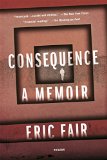Summary | Excerpt | Reviews | Beyond the book | Read-Alikes | Genres & Themes | Author Bio

A Memoir
by Eric FairConsequence is Eric Fair's memoir of his time as a private contractor in Iraq. He also describes the path that led him there and life after he returned to the United States. Part confession, part search for redemption, the book is a brutally honest account of Fair's experiences as an interrogator and the profound personal impact in the wake of a decision to "do his part" for his country.
Fair's account begins with his childhood and adolescence, clearly outlining the people and events that impacted the choices he made that eventually led him overseas. Heavily active in – and influenced by – the Presbyterian Church he explored becoming a Presbyterian minister. His true love, though, was for law enforcement, and after college and one tour of duty in the U.S. Army – during which he trained as an Arabic linguist – he was able to enroll in the police department in Bethlehem, PA. A rare heart condition shortly ended his career, however, and also prevented him from re-enlisting with the military in spite of the fact that the Iraq War was just beginning and recruits were needed. Lying about his cardiomyopathy, he first joined the National Security Agency and eventually found his way to Iraq as a private contractor working as an interrogator.
The author's experiences in Iraq, and the acts he witnessed and participated in during his time in the country make up the bulk of the book. While he himself never committed some of the more heinous acts against detainees, such as waterboarding, he frankly admits to being a torturer and to failing to report the beatings and similar acts he watched others commit. Fair's religious background forces him to acknowledge that he was in the wrong. "In Scripture," he writes, "God often works in prisons, but he is never on the side of the jailer. He is always on the side of the prisoner."
As the narrative continues, the author feels progressively worse about how the detainees are treated, but continues to participate although, as a contractor, he could quit any time. Repeatedly he acknowledges he's strayed from God's path and is on his own ("I have not just taken the wrong path. I have walked in the wrong direction entirely."). He senses he's beyond redemption, that there will be no forgiveness, and he bears a great sense of shame for the person he's become. Playing into his apprehensions are his feelings of guilt regarding how he's treated his wife, Karin, failing to appreciate the difficulties she's enduring back on the home front. Worse, he blames her for his own shortcomings as well as his determination to abide by the Army ethos of never quitting or looking weak in any way.
Although the author writes from a strongly Christian point of view, the book isn't a sermon on the evils of torture, nor does it delve into philosophical discussion. It remains a highly personal account throughout, focusing on actions, events and people. It's unlikely most readers will learn more about conditions in Iraq during the war there but they will gain a greater understanding of the permanent psychological impact such a war can have on those who participate.
This book will be a challenge for many. Stylistically, the author writes in short, clipped sentences with little variation, and I found that the technique grated a bit after a while. The author also includes a few descriptions of the torture sessions he conducted and observed, and at times these are stomach-turning.
The larger issue may be the narrative's overall tone; the author seems unrelentingly despondent throughout. The book's tenor is one of profound regret for the choices he has made as well as deep cynicism for the organizations he's worked for. It's painful to read how disappointed Fair is with his life:
I wake up and look at my son, and I think I've made a mistake. I think the decision to start a family is another wrong path; a symptom of my instability, another poorly planned transition, another closed door...I am lost, and I will never get back. I need to get out of the way...In Karin's room in the maternity ward, with my son lying at her feet, I think it is time to kill myself. I am interfering with too many other lives, too many other paths. I've been in Karin's way for years, holding her back, preventing her from moving forward while I looked backward and tried to salvage what was already gone.
While there's a small glimmer of hope toward the end, there's not really enough positive energy to leave readers with the feeling that things will get better for Fair and his family. One can't fault him for his honesty, and the way he conveys his mental state is profoundly affecting, but it certainly will affect readers.
That's not to say I don't recommend Consequence or that I am sorry I read it; I've long been fascinated by books about how wars impact those who've participated in them, and this book is among the best I've read. However, it will not appeal to everyone given its distressing subject matter and mood. Those searching for more understanding about the psychological effects of war are most likely to appreciate Fair's work.
![]() This review was originally published in The BookBrowse Review in May 2016, and has been updated for the
April 2017 edition.
Click here to go to this issue.
This review was originally published in The BookBrowse Review in May 2016, and has been updated for the
April 2017 edition.
Click here to go to this issue.

If you liked Consequence, try these:

by Ian Fritz
Published 2024
A powerful, timely memoir of a young Air Force linguist coming-of-age in a war that is lost.

by Jeffrey Lent
Published 2017
The sweeping, intergenerational story of a Vermont family, from WWII to the dawning of the '60s - the most magisterial and moving novel of acclaimed author Jeffrey Lent's career.
Your guide toexceptional books
BookBrowse seeks out and recommends the best in contemporary fiction and nonfiction—books that not only engage and entertain but also deepen our understanding of ourselves and the world around us.